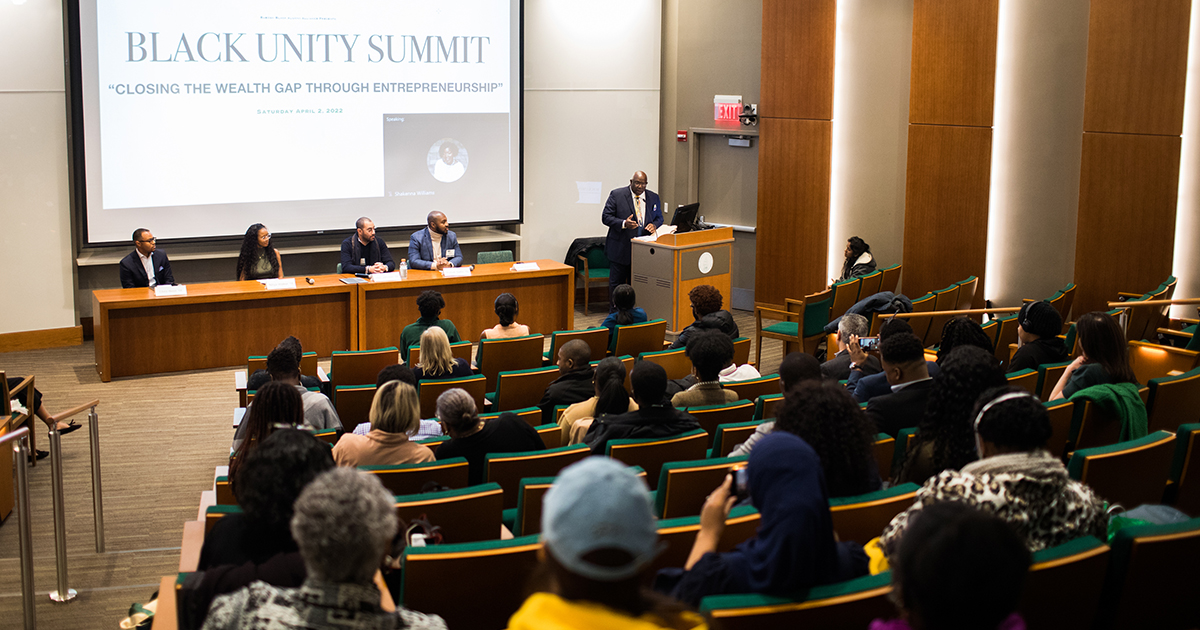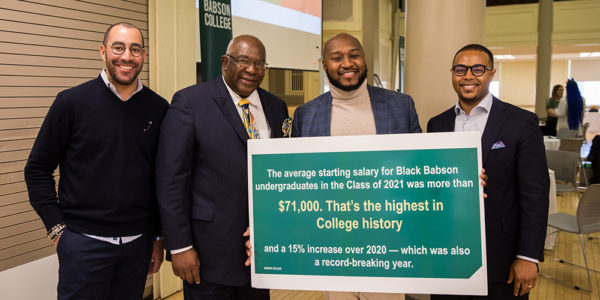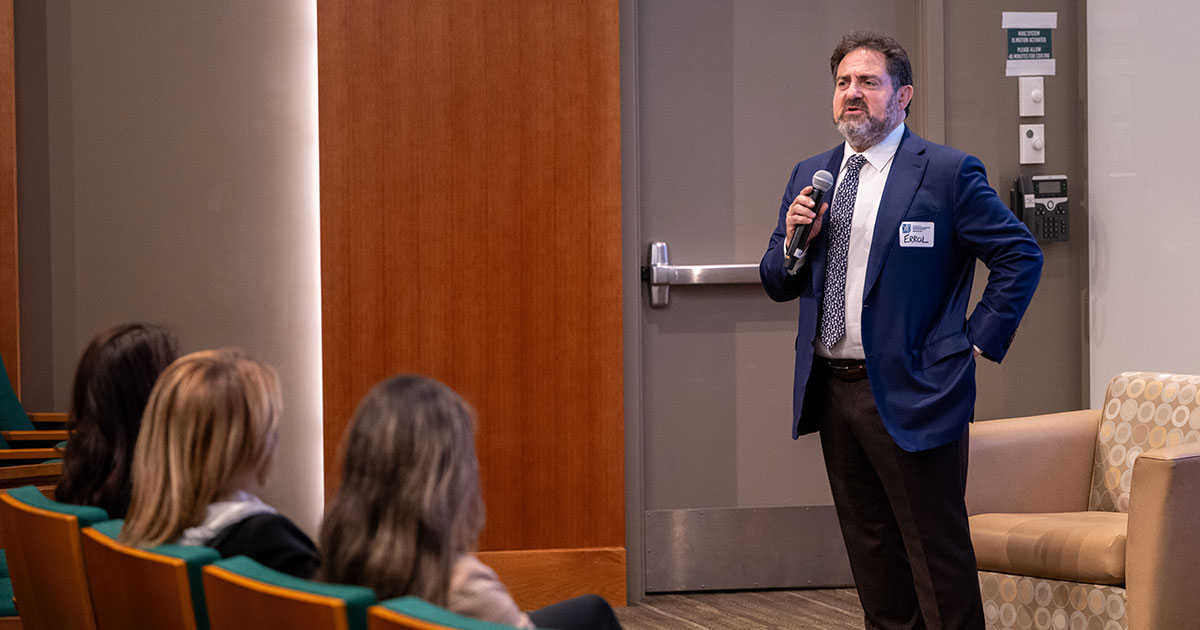Closing the Wealth Gap Through Entrepreneurship

Eight dollars. That’s the median net worth of a non-immigrant Black household in Boston, according to a well-publicized 2015 report. Yes, $8.
The statistic is so stark that The Johnson House—Babson College’s special-interest living space for the Black Student Union—opened in 2020 with the stated mission of helping create solutions to address the problem in its own backyard.
One of the keys to closing the wealth gap is through entrepreneurship, which was the focus of an alumni panel discussion hosted by the Babson Black Alumni Alliance (BBAA) at the College’s recent Black Unity Summit.
“Without a doubt, entrepreneurship has proven to be one of the most effective ways of closing the wealth gap,” Gerald Watson ’76, founding chair of BBAA, said in his introductory remarks. “We have a very rich network of Black alumni who have excelled in industries and businesses all over the world.”
The panel tapped into that network of distinguished alumni, who shared their experiences and their expertise, focusing on practical advice and proven strategies and covering everything from starting, selling, and buying a business to real estate, private equity and corporate finance, and social entrepreneurship.
“The alumni panel was like getting a real-word college education in 90 minutes,” said Madison Spence ’23. “Listening to the alumni and getting their advice proved to me that if they can do it, I can do it, too.”
The Value of a Babson Degree
Babson’s alumni not only know the importance of entrepreneurship, but they also know the extraordinary value of their Babson degrees.
The undergraduate Class of 2021 illustrates the success that Babson alumni realize immediately. Within six months of graduation, 99.5% of members of the undergraduate Class of 2021 were either employed or continuing their education. And, the average starting salary for Babson’s undergraduate Class of 2021 was $62,525—the highest in school history.
For Babson’s Black graduates, the financial impact is even greater. In 2021, the average starting salary for graduating Black seniors from Babson was more than $71,000—also the highest in school history and a 15% increase over 2020. That compares favorably with the national average of $55,260, according to the National Association of Colleges and Employers.
“Without a doubt, entrepreneurship has proven to be one of the most effective ways of closing the wealth gap. We have a very rich network of Black alumni who have excelled in industries and businesses all over the world.”
Gerald Watson ’76, founding chair of the Babson Black Alumni Alliance
“It is essential for our students to know the value proposition of their Babson degree,” said Babson President Stephen Spinelli Jr. MBA’92, PhD.
On the BBAA panel, Shakenna Williams ’94—the founder of Babson’s Black Women’s Entrepreneurial Leadership (BWEL) program and the executive director of the Center for Women’s Entrepreneurial Leadership (CWEL) at Babson College—spoke about all the work that BWEL and CWEL are doing to provide support for Babson students, especially women and Black entrepreneurs.
“Babson should be and we are going to be a resource partner to really eradicate the challenges that Black entrepreneurs have gone through for so many years,” Williams said. “Many of us are entrepreneurs, and we didn’t have these resources.”

Panelists (from left) John Johnson ’08, Gerald Watson ’76, Shatiek Gatlin ’16, and Chris West ’18 celebrate the success of Babson’s Black alumni in the Class of 2021 at the College’s Black Unity Summit. (Photo: Jack Belcher)
Alumni Advice and Expertise
The other alumni panelists shared their experiences and their lessons about creating wealth and closing the gap through a variety of different types of entrepreneurship.
Chris West ’18, an investment professional at H.I.G. Capital, explained how financial institutions—including venture capital firms, investment banks, and private equity firms—are the bridge between entrepreneurs and wealth creation.
West also outlined three ways in which trust can be restored between the Black community and those critical financial institutions: One, build relationships with the people inside the institutions. Two, build and grow the pipeline of Black professionals to decision-making roles in those institutions. And, three, build and grow Black-owned financial institutions, because, he said, “in reality, we are the only ones who understand our distinct nuanced cultures and needs.”

Nitiya Walker ’14, a Posse Leadership Scholar at Babson, shared her expertise in social entrepreneurship. (Photo: Jack Belcher)
Nitiya Walker ’14, a Posse Leadership Scholar at Babson, shared her experience as the founder of Seeds of Fortune, a nonprofit that teaches young women of color financial literacy and helps them to apply for college scholarships. In 2021, Walker was named to Forbes’ prestigious 30 Under 30 list in the education category.
She offered several pieces of advice for students, including the importance of finding your tribe and relying on them. “Sometimes, as Black and brown people, we feel like we have to go outside of our community to find our strength and our connection,” Walker said, “but we have all the power within us to make things happen and to be able to progress.”
John Johnson ’08, who serves on the Babson College Board of Trustees, spoke about entrepreneurship through acquisition. “I made the decision that I don’t necessarily want to be an entrepreneur that takes something from zero to one, but I can take something from one to two,” he said. Johnson described in detail his recent experience of purchasing a $20 million business, Catalina Finer Food Corp., where he also now is the president.
Jesse Jenkins ’71—who has 50-plus years of experience in the tax accounting business and has owned his firm, Jay Tax Enterprizes, for more than 30 years—spoke about real estate entrepreneurship, as well as the importance of understanding taxes, and life and health insurance.
And, Shatiek Gatlin ’16, a finance manager at Vita Coco and former Babson trustee who also was a Posse Leadership Scholar, spoke about generational wealth, not just creating and passing financial wealth down within a family, but also sharing the wealth of knowledge within your community.




